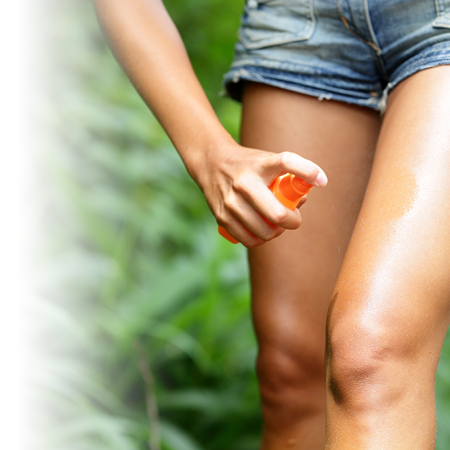Summer doesn't just bring with it pretty butterflies, it also brings mosquitoes... and their stings! Find out how to protect yourself.
1
Why is it so important to protect against mosquitoes and ticks?
Effective protection against mosquitoes (and ticks) can definitely make an outdoor experience more pleasant. Insect stings (or bites) can cause uncomfortable symptoms such as redness, swelling, and itching. However, this isn’t the main reason to use insect repellent. In fact, these insects can carry diseases that can be transmitted to humans.
Insect stings can be the source of many types of infection. However, in Quebec, the main concern is the West Nile virus, transmitted by mosquitoes, and Lyme disease, spread by tick bites. Although infrequent, both of these diseases may resolve on their own, but there can sometimes be long-term complications. When travelling abroad, paludism (also called malaria) also requires protection.
The best way to protect against the West Nile virus and Lyme disease is to apply insect repellent before and during high-risk activities.
2
What insect repellent should I choose for my family?
Many insect repellents are available on the market. However, it would be incorrect to say that they are all equal. It's important to choose the right product according to your needs, age, and the duration of the outdoor activity.
DEET and icaridin are choice options except for babies under 6 months. They have the advantage of protecting against mosquito AND tick bites. The duration of protection varies according to the DEET concentration chosen. A 30% concentration provides up to 6 hours of protection; a 10% concentration, up to 3 hours.
Icaridin provides 3 to 5 hours of protection when used at a concentration of 10%, and 6 to 10 hours when used at a concentration of 20%. It is an interesting and safe option for children 6 months and older. Soybean oil and p-menthane-3.8 diol, provide 3 hours and 2 hours of mosquito protection respectively.
3
How should I apply insect repellent?
There are a number of precautions to be taken when using insect repellent, especially on children, to minimize product absorption by the skin:
- Apply insect repellent to exposed skin and clothing (not under clothing).
- Spray aerosol insect repellent in the hands before applying it to a child’s skin.
- Choose a lower percentage of DEET if you are going outdoors for a short time.
- Wash skin with soap and water as soon as protection against mosquitoes is no longer needed.
- Test a child's tolerance to insect repellent for the first time: apply the product to a forearm and wait 24 hours to see if an adverse reaction occurs. If so, do not use insect repellent.
Pregnant women are advised to apply insect repellent to clothing rather than skin, if possible, to limit absorption. Speak to your pharmacist if you are pregnant and wish to use insect repellent.
4
What other preventive measures can I take against mosquito bites?
Insect repellent is only part of protection against mosquito bites. In fact, there are a number of habits that can help keep these pesky critters at a distance.
First, mosquitoes are much more active at dawn and dusk, particularly near wooded areas or tall grass. So, it's best to avoid going out at these times of day. Dressing appropriately is also important: wear full length, light-coloured clothing, closed shoes, and tuck your sweater into your pants and pull your socks up over your pant legs.
Ensuring that window screens are intact, and that doors are securely closed will also prevent these unwanted visitors from coming into your home. Lastly, objects where water can stagnate, such as pool liners, children's pools or flowerpot saucers, should be monitored and cleaned regularly.
5
Can I apply insect repellent at the same time as sunscreen?
Sun protection is just as important as protecting against insect bites. It is possible to apply both sunscreen and insect repellent, but it must be done the right way. Sunscreen should be applied at least 20 minutes before insect repellent. Products containing both sunscreen and insect repellent should be avoided.
Following the tips mentioned in this article will help keep your family safe from insect bites. Your pharmacist can help you to make the right choice among the wide range of insect repellents available on the market. With the right protection, all that’s left for you to do is enjoy the summer!

